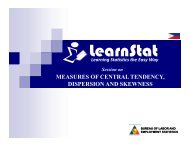Tripartite Validation Workshop of the Philippines Decent Work ...
Tripartite Validation Workshop of the Philippines Decent Work ...
Tripartite Validation Workshop of the Philippines Decent Work ...
You also want an ePaper? Increase the reach of your titles
YUMPU automatically turns print PDFs into web optimized ePapers that Google loves.
The increasing number <strong>of</strong> female overseas workers points to <strong>the</strong> relevance <strong>of</strong> this element<br />
in overseas employment. From <strong>the</strong> perspective <strong>of</strong> promoting decent work, questions were<br />
asked as to whe<strong>the</strong>r overseas employment is within <strong>the</strong> purview <strong>of</strong> <strong>the</strong> sending country. If<br />
it is, <strong>the</strong>n statistical indicators need to cover <strong>the</strong>m –although this is currently a major<br />
challenge that will not be overcome in <strong>the</strong> short run. If it is not, however, questions <strong>the</strong>n<br />
arise as to how a country like <strong>the</strong> <strong>Philippines</strong> can actually define decent work for its<br />
nationals working overseas? (See also Chapters 5 & 7).<br />
Unequal opportunity and treatment may also be evident in <strong>the</strong> hiring and firing practices<br />
(as opposed to coded policies) <strong>of</strong> companies ins<strong>of</strong>ar as such practices take into account,<br />
wittingly or unwittingly, <strong>the</strong> worker’s marital status, sexual orientation, and accumulated<br />
leave benefits –particularly <strong>of</strong> women workers. In this respect, <strong>the</strong> chapter may benefit<br />
from <strong>the</strong> recent ILS (Institute <strong>of</strong> Labor Studies, DOLE) study on gender discrimination.<br />
An indicator <strong>of</strong> sexual harassment in <strong>the</strong> workplace should be included ei<strong>the</strong>r in this<br />
chapter or in <strong>the</strong> chapter on safe work. Fur<strong>the</strong>rmore, data on <strong>the</strong> public sector should be<br />
included. The same comment is made in relation to chapter 11 (Social Dialogue) and<br />
chapter 7 (Stability and Security at <strong>Work</strong>).<br />
On <strong>the</strong> legal framework, it was observed that <strong>the</strong> rising number <strong>of</strong> laws and policy reforms<br />
giving more benefits to women may be contradictory to emerging trends, whereby men are<br />
taking on increased responsibilities for childcare and raising families.<br />
The legal framework should include o<strong>the</strong>r conventions (non-ILO) that promote equal<br />
opportunity and treatment at work and elsewhere. Examples include: Convention on <strong>the</strong><br />
Elimination <strong>of</strong> Discrimination Against Women (CEDAW), Convention on Rights <strong>of</strong><br />
Persons with Disabilities (CRPD), Madrid Programme <strong>of</strong> Action for Senior Citizens,<br />
Yogyakarta Principles on <strong>the</strong> Application <strong>of</strong> International Human Rights Law in relation to<br />
Sexual Orientation and Gender Identity, Convention on <strong>the</strong> Rights <strong>of</strong> Migrant <strong>Work</strong>ers,<br />
International Covenant on Social, Economic and Cultural Rights.<br />
4.10. Chapter 9: Safe <strong>Work</strong> Environment<br />
It was noted that <strong>the</strong> Pr<strong>of</strong>ile should better indicate and explain data limitations. For<br />
example, data on occupational disease incidence may understate <strong>the</strong> true incidence by not<br />
counting those workers who suffer from more than one disease.<br />
Data on accidents, injuries and disease should be correlated with compliance to labour<br />
standards across regions in order to identify problem areas and take appropriate action.<br />
Fur<strong>the</strong>r disaggregation by region, injuries/disease categories, industry, and size <strong>of</strong><br />
establishment would also be useful. Data on work accidents from administrative reports<br />
may be presented in future updates <strong>of</strong> <strong>the</strong> Pr<strong>of</strong>ile.<br />
At <strong>the</strong> same time, <strong>the</strong> Pr<strong>of</strong>ile should present data on rates <strong>of</strong> compliance to labour<br />
standards generated through inspection. The case <strong>of</strong> small establishments, which make up<br />
90 per cent <strong>of</strong> all establishments, presents a dilemma. Under <strong>the</strong> Labor Standards<br />
Enforcement Framework (LSEF), DOLE undertakes advisory services only. Yet <strong>the</strong>re is<br />
generally low compliance rate in regions outside <strong>the</strong> National Capital Region (NCR),<br />
where 75 per cent <strong>of</strong> small establishments operate.<br />
Ano<strong>the</strong>r relevant government intervention that is helping develop safe work practices<br />
among smaller enterprises is <strong>the</strong> DOLE Kapatiran program, which brings toge<strong>the</strong>r large<br />
and small enterprises into a big-bro<strong>the</strong>r-little-bro<strong>the</strong>r partnership. The program can serve<br />
as vehicle for promoting safe work and encouraging voluntary compliance with labour<br />
standards. For example, some big companies tie <strong>the</strong> continuation <strong>of</strong> business contracts with<br />
<strong>the</strong>ir smaller counterparts to <strong>the</strong> latter’s compliance with labour standard.<br />
17



